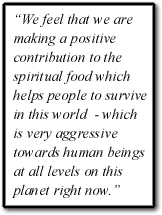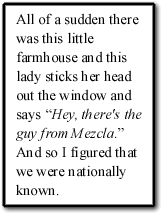|
|
|
 |
|
“…people have jazz, have rumba, salsa, they have rock-n-roll, they have son, you know... So it seems logical to have musicians who would also like to play all of that stuff.” --- Pablo Menéndez |
 |
||||
| Mezcla | ||||
| A Popular Cuban Music Band | ||||
|
Tell us something about Mezcla's beginnings and what the band represents. Pablo Menéndez - Mezcla is a band as close as possible to what I had always dreamed of, where the definition of the style of the band was wide enough so that one could play all of the music that you loved and wanted to play. Not long after school I became involved with Experimentación Sonora del ICAIC - the Experimental Sound Collective of the Cuban Film Institute. This was a very eclectic collective of singer-songwriters and musicians and would do different things according to who was composing the different compositions. After that I played in a number of bands. One was Síntesis, which at that time was wanting to play kind of symphonic rock-Nueva Trova. I was trying to get them more involved in Afro-Cuban, Yoruba rock-type stuff that we later evolved that band into. I was also playing in a jazz group - Sonido Contemporáneo - which I was pushing towards more Latin Jazz. I was also doing a back-up thing in a duo with my mother, blues singer Barbara Dane, arranging things for different singer-songwriters, working as a studio musician, jamming with different people. Mezcla became a way for me to put all of these different things in place. Instead of this craziness of running from one band or one rehearsal to the next Mezcla was able to satisfy all of my musical needs. What I set out to do was find other musicians who had the same type of problems. Loved to do things with Cuban son, and also liked to play jazz, background in rock-n-roll or in rumba. And so the band is hard to put into a box and say what kind of band it is. I wanted for the band to be able to play in a rumba festival, and we've done so, along with folks like Los Muñequitos de Matanzas, or Yoruba Andabo or Clave y Guaguancó. Or a son festival, we've done that, too. Or we've been in jazz festivals here in Havana and abroad, we've been in rock festivals, we've been in Nueva Canción festivals, Latin American music festivals, we've fit into all of them - Caribbean arts festivals, reggae festivals, anything. Because we do a little bit of all of that in one band. |
||||
|
What interests a musician in playing with Mezcla? Why would a musician join the band? Pablo Menéndez - I think one of the things that makes the band attractive for musicians is that our band has the possibility of taking advantage of all of the talents of the musicians in the band, so that we can showcase them in all of their possibilities. One is supporting another on a solo thing, and saying "this is your moment to be a star." And then you turn around and support the other one, and it has a very collective atmosphere around it. I think this is attractive to the musicians, and also to the audience. |
 |
|||
|
The other thing I think is that, stylistically also, we try be true to our own musical tastes. I think this corresponds to what you find when you go to someone's house - you know, musicians have this terrible habit when they walk into your house the first thing they want to look at is your record collection, just to check it out. You know a lot about a person when you look at their record collection. A lot of times I find that people have jazz, have rumba, salsa, they have rock-n-roll, they have son, you know. It's the same person that sits down and listens to all of this stuff. So it seems logical to have musicians who would also like to play all of that stuff. I wake up in the morning and want to hear something. In my case what I hear is kiddy music, children's music, because I have a four year old grandson. So I'm listening to baby songs (laughs). But then I might want to listen to some sort of news program with a certain type of music. And then I may want to hear some jazz, or later in the day some salsa to dance to. And then later maybe we're going to have a little party with some people who are good at rumba. Or I might want to go to a concert and listen to some electronic music or contemporary music, classical music, anything. You're the same person, but during the day, or at different moments of the soundtrack of your life you can have different tastes. So one of the things that Mezcla tries to do is to deal with this schizophrenia, and the band is attractive to musicians who feel restricted in a band which plays only one type of music, like reggae, or jazz, or rancheras. We play everything from blues to jazz to rumba and that's very entertaining for musicians. Finally, we choose the songs and material in a conscious way. We feel that we are making a positive contribution to the spiritual food which helps people to survive in this world - which is very aggressive towards human beings at all levels on this planet right now. We try to be very in touch with the whole world, and also with the undercurrents and inner happenings of our own situation locally. And we try to be honest and up front about our position in it. We're definitely not opportunists. I mean just this thing about money right now and the economic thing, the thing of wanting to find venues to play for Cubans at five pesos a ticket, instead of trying to play twenty dollar ticket, tourist-only types of places is part of the general attitude which finds its way into what the songs are, the type of message we try to transmit. If you're for real and you're being honest with the audience and yourself, then you have to find venues and ways of communicating that to people. Not any hype. In part I have had the luck to find other musicians who have had that same need for a musical vehicle like this. But a big reason that such people have existed is because of the tremendous amount of support the Cultural Ministry in Cuba was giving to professional musicians. We didn't have to follow market trends, rather what was in our hearts and what we believed in. It turned out that this struck a chord in our audience, which I also I think is very sensitive as to whether musicians are really playing what they believe in, if it's for real. |
||||
 |
There have been a couple of occasions where I have heard younger musicians refer to Mezcla as being legendary (Pablo laughs). That may provoke all kinds of thoughts in your mind. But my question is, when did you know that the band had made it here in Cuba, and what helped you turn the corner. Pablo Menéndez - Well, a couple of things to put this into a context. First, I was the youngest member of Experimentación Sonora, and worked with Silvio Rodriguez, Pablo Milanés, Sara González, Emiliano Salvador - different Cubans who opened up a lot of doors for the new Cuban music of the 1970s and 80s. Partly because of my |
|||
|
youth, when the next generation came along I was very active in that stage, with Síntesis and things like that. When I started Mezcla and I kind of give the official date is 1985 although we had been trying to put it together for about two years - we began to do things on TV and radio and had some hit songs. By the late 1980s we were playing for tremendous amounts of people at these massive concerts in the biggest plaza in Havana. These were probably the most intense expressions of audience identification with music that I've ever seen. Another thing is that I have kept very much in touch with the younger bands and the younger musicians, and we do a lot of stuff together with them. We were holding down being the host band at a venue that had all of the younger alternative rock scene, so we had a lot of contact with the younger musicians. And, I guess they had just seen me being around for such a long time in the band. We have had this past thing of being on a whole lot of TV. A while back somebody asked me for some footage of the band, and I had been taping stuff off the TV on a VCR at home for some time. I realized I had like twelve or sixteen hours - a tremendous amount of air play, and this didn't include all the re-runs. When we first started out, the audiences at our concerts would be a lot of high school, in fact even junior high school, and college kids. Then I remember in 1988 we went out on tour in Oriente, and we did this small town Palma Soriano, in the mountains near Santiago. I had taken along a bicycle so I could take a ride into the mountains, way out onto the back roads. And I was just riding along enjoying the sunshine and things and all of a sudden there was this little farmhouse and this lady sticks her head out the window and says "Hey, there's the guy from Mezcla." And so I figured that we were nationally known. At a certain point around 1988 or 89 we did this song Río Quibú, which spoke about people living in sub-standard housing or who were confronting similar difficulties. I would go by a construction site and all of the workers would say "Hey, there's the Mezcla guy." One of the things with Mezcla is that you get a mixture of audiences. On a deeper philosophical level, when we say Mezcla we're talking about one of the biggest mixtures of humanity - a mixture of different nationalities of Africa and of Europe in the Americas. Cuba is the center of that. Inside the music of Cuba we mix all the genres. First of all a mixture of trova and of son, danceable music, some of the Afro-Cuban or folkloric music, the Latin Jazz fusion-type stuff. We play music from all around the world. Different elements of the repertoire appeal to different elements of the audience. When we went to the United States in 1997 and '98 this was something which was really amazing. I hadn't done too much performing there since I had moved away, and these were my first real tours there. And in the United States people are very divided, the audience. You know, there are Latinos over here, and Blacks over there, whites over here, Asians over here, Indians over there. And when we would play we would see those different kinds of elements come together at least for the time of the concert was going on. The same as when you look at Mezcla and you see the different generations, the different sexes, that different types of musicians can live and play together in harmony. Well, the audience in the United States that we saw was all very harmoniously enjoying the music. That was something that I really liked because one of the objectives that I have in music is to able to communicate with people and to communicate on that level that message, that basic thing. Our lyrics sometimes talk about different problems that exist, some things that people might need to hear about. This helps people to recognize their own problems and know that at least somebody knows that they are going through some sort of a hardship, dealing with contradictions in society on whatever level. Also, all of our music has a very optimistic tone about it. It's stuff that you're supposed to enjoy. And I think people do enjoy it a whole lot. You know, it's dance music basically, all of it. The thing is that, if you're part of this Afro-American experience, this mixture, you have to remember that the African part didn't come voluntarily to the Americas, and that after 500 years of perpetrating everything possible in terms of cultural genocide, that culture and the music of that culture are the most dominant influences on pop culture around the world. So that means it is music of survival, and that's what this is all about. |
||||
| HOME | CUBANIA! | ABOUT CUBA | ARTIST INTERVIEWS | LINKS | EMAIL | ||||
| For more on Mezcla, including a complete discography, song lyrics and audio samples, visit the Mezcla website at http://www. Mezcla.org | ||||